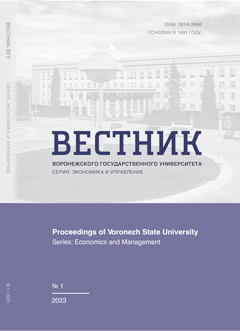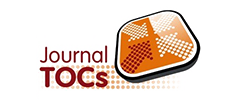Анализ подходов к оценке уровня доверия
Аннотация
Предмет. Современные условия нестабильной внешней среды оказывают сильное воздействие на функционирование общества и возможность его устойчивого развития. Одним из факторов, определяющих внутренний потенциал общества к повышению уровня устойчивости является доверие. Исследование потенциала доверия как фактора стабильности и устойчивости общества связано с необходимостью оценки его уровня, которая затрудняется отсутствием единого подхода и искажениями, присущими существующим подходам.
Цель. Целью данной работы является изучение основных подходов к оценке уровня доверия в сообществе и идентификация характерных для них ограничений и искажений. Автором были проанализированы опросный и экспериментальный подходы, а также приведены примеры косвенной оценки уровня доверия через социальные дисфункции и с использованием эконометрического аппарата.
Методология. В рамках данной работы для достижения поставленной цели была изучена актуальная отечественная и зарубежная экономическая литература и методологические указания международных организаций по тематике, также использовался диалектический метод и метод анализа.
Выводы. В статье была произведена систематизация существующих методов и подходов к оценке уровня доверия в обществе, проанализированы основные преимущества и недостатки опросного и экспериментального подхода, как двух доминирующих в исследованиях, посвященных теме доверия. Были изучены примеры оценки уровня доверия в сообществе через социальные дисфункции и социальный капитал, также исходя из ограничений существующих методов и подходов была рассмотрена возможность применения инструментов математического моделирования для поиска взаимосвязей между различными социально-экономических показателями и уровнем доверия (приведен пример модели с латентными переменными и описаны преимущества ее потенциального применения). В итоге, были сделаны выводы о возможностях и ограничениях существующих подходов к оценке уровня доверия и необходимости дальнейшей работы в области их совершенствования.
Литература
Дементьев, В. Е. (2021). Уверенность в будущем как фактор экономического развития // Экономическое Возрождение России, 1, 54–62. [Dementyev V.E. (2021). Confidence in the future as an economic development factor. The Economic Revival of Russia, 1, 54–62. (In Russian).]
Кривопусков, В. В. (2013). Методологические основания социологического исследования доверия как фактора консолидации российского общества // Гуманитарные, Социально-Экономические и Общественные Науки. Серия: Социологические Науки, 1. [Krivopuskov, V. V. (2013). Conceptualization of trust as a sociological phenomenon. Humanities, Social-economic and Social Sciences. Series: Social Sciences, 1. (In Russian).] http://www.online-science.ru/m/products/social_sciense/gid297/pg0/
Полтерович, В. М. (2022). Экономическая теория и формирование человеческих качеств // AlterEconomics, 19(2), 201–211. [Polterovich, V. M. (2022). Economic theory and the formation of human qualities. AlterEconomics, 19(2), 201–211. (In Russian).]
Трындина, Н. С., & Устюжанина, Е. В. (2023). Доверие как экономическая категория: подходы к классификации и систематизации // Креативная Экономика, 17(1). [Tryndina, N. S., & Ustyuzhina, E. V. (2023). Trust as an economic category: approaches to classification and systematisation. Creative Economy, 17(1). (In Russian).] https://doi.org/10.18334/ce.17.1.116590
Algan, Y., & Cahuc, P. (2014). Trust, Growth, and Well-Being: New Evidence and Policy Implications. Handbook of Economic Growth, 2(7464), 49–120. https://doi.org/10.1016/B978-0-444-53538-2.00002-2
Benz, M., Frey, B. S., & Stutzer, A. A. S. (2005). Introducing Procedural Utility: Not Only What, But Also How Matters. SSRN Electronic Journal, 160(3), 377–401. https://doi.org/10.2139/ssrn.338568
Berg, J., Dickhaut, J., & McCabe, K. (1995). Trust, reciprocity, and social history. Games and Economic Behavior, 10, 122–142.
Bertelsen, M., Alsop, R., Bertelsen, M. F., & Holland, J. (2006). Empowerment in Practice: From Analysis to Implementation. Development, 390. http://siteresources.worldbank.org/WBI/Resources/EmpowermentLearningModulebody.pdf
Boarini, R., Comola, M., Smith, C., Manchin, R., & de Keulenaer, F. (2012). What Makes for a Better Life?: The Determinants of Subjective Well-Being in OECD Countries - Evidence from the Gallup World Poll. In OECD Statistics Working Papers (Issue 2012/03). OECD Publishing. https://doi.org/http://dx.doi.org/10.1787/5k9b9ltjm937-en
Bolton, G. E., & Ockenfels, A. (2006). Inequality aversion, efficiency, and maximin preferences in simple distribution experiments: Comment. American Economic Review, 96(5), 1906–1911. https://doi.org/10.1257/aer.96.5.1906
Bourdieu, P. (2018). Distinction: A social critique of the judgement of taste. In R. & K. Paul (Ed.), Inequality: Classic Readings in Race, Class, and Gender. https://doi.org/10.4324/9781315680347-10
Brehm, J., & Rahn, W. (1997). Individual-Level Evidence for the Causes and Consequences of Social Capital. American Journal of Political Science, 41(3), 999. https://doi.org/10.2307/2111684
Cameron, L. A. (1999). Raising the stakes in the ultimatum game: Experimental evidence from Indonesia. Economic Inquiry, 37(1), 47–59. https://doi.org/10.1111/j.1465-7295.1999.tb01415.x
Carpenter, J., Verhoogen, E., & Burks, S. (2005). The effect of stakes in distribution experiments. Economics Letters, 86(3), 393–398. https://doi.org/10.1016/j.econlet.2004.08.007
Coleman, J. S. (2009). Social capital in the creation of human capital. Knowledge and Social Capital, 94, 17–42. https://doi.org/10.1086/228943
Delhey, J., Newton, K., & Welzel, C. (2011). How general is trust in “most people”? Solving the radius of trust problem. American Sociological Review, 76(5), 786–807. https://doi.org/10.1177/0003122411420817
Falk, A., & Fischbacher, U. (2006). A theory of reciprocity. Games and Economic Behavior, 54(2), 293–315. https://doi.org/10.1016/j.geb.2005.03.001
Fehr, E., & Schmidt, Kl. M. (2011). A theory of fairness, competition, and cooperation. Advances in Behavioral Economics, 114(3), 271–296. https://doi.org/10.2307/j.ctvcm4j8j.14
Fehr, E., Tougareva, E., & Fischbacher, U. (2014). Do high stakes and competition undermine fair behaviour? Evidence from Russia. Journal of Economic Behavior and Organization, 108, 354–363. https://doi.org/10.1016/j.jebo.2013.09.005
Felte, E. (2001). Finders keepers. Reader’s Digest.
Fleche, S., Smith, C., & Sorsa, P. (2012). Exploring determinants of subjective wellbeing in OECD countries: Evidence from the World Values Survey. In Journal of Poverty and Social Justice (Vol. 20, Issue 2). OECD Publishing. https://doi.org/10.1332/175982712X652122
Forsythe, R., Horowitz, J. L., Savin, N. E., & Sefton, M. (1994). Fairness in simple bargaining experiments. Games and Economic Behavior, 6(3), 347–369. https://doi.org/10.1006/game.1994.1021
Freitag, M., & Traunmüller, R. (2009). Spheres of trust: An empirical analysis of the foundations of particularised and generalised trust. European Journal of Political Research, 48(6), 782–803. https://doi.org/10.1111/j.1475-6765.2009.00849.x
Frey, B. S., & Stutzer, A. (2005). Beyond outcomes: Measuring procedural utility. Oxford Economic Papers, 57(1), 90–111. https://doi.org/10.1093/oep/gpi002
Frey, B. S., & Stutzer, A. (2006). “Direct Democracy: Designing a Living Constitution.” In Democratic Constitutional Design and Public Policy. In R. Congleton & B. Swedenborg (Eds.), Analysis and Evidence. MA: MIT Press.
Helliwell, John F., dan R. D. P. (2004). The social context of well-being.” In Philosophical Transactions of the Royal Society. B: Biological Sciences, 359, 1435–1446. https://doi.org/10.1098/rstb.2004.1522
Helliwell, J. F., Huang, H., & Wang, S. (2017). New evidence on trust and well-being. The Oxford Handbook of Social and Political Trust, w22450, 409–446. https://doi.org/10.1093/oxfordhb/9780190274801.013.9
Hoffman, E., McCabe, K. A., & Smith, V. L. (1998). Behavioral foundations of reciprocity: Experimental economics and evolutionary psychology. Economic Inquiry, 36(3), 335–352. https://doi.org/10.1111/j.1465-7295.1998.tb01719.x
Justwan, F., Bakker, R., & Berejikian, J. D. (2018). Measuring social trust and trusting the measure. Social Science Journal, 55(2), 149–159. https://doi.org/10.1016/j.soscij.2017.10.001
King, G., Murray, C. J. L., Salomon, J. A., & Tandon, A. (2004). Enhancing the Validity and Cross-Cultural Comparability of Measurement in Survey Research. American Political Science Review, 98(1), 191–207. https://doi.org/10.1017/S000305540400108X
Knack, S., & Keefer, P. (1997). Does social capital have an economic payoff? A cross-country investigation. Quarterly Journal of Economics, 112(4), 1251–1288. https://doi.org/10.1162/003355300555475
Levitt, S. D., & List, J. A. (2007). What do laboratory experiments measuring social preferences reveal about the real world? Journal of Economic Perspectives, 21(2), 153–174. https://doi.org/10.1257/jep.21.2.153
List, J. A., & Cherry, T. L. (2008). Examining the role of fairness in high stakes allocation decisions. Journal of Economic Behavior and Organization, 65(1), 1–8. https://doi.org/10.1016/j.jebo.2003.09.021
Morrone, A., Tontoranelli, N., & Ranuzzi, G. (2009). How Good is Trust ? PROGRESS OF SOCIETIES. In OECD Statistics Working Papers 2009/3. OECD Publishing.
Munier, B., & Zaharia, C. (2002). High stakes and acceptance behavior in ultimatum bargaining: A contribution from an international experiment. Theory and Decision, 53(3), 187–207. https://doi.org/10.1023/A:1022815832351
New Zealand Ministry of Justice. (2014). New Zealand Crime and Safety Survey.
Newton, K., & Zmerli, S. (2011). Three forms of trust and their association. European Political Science Review, 3(2), 169–200. https://doi.org/10.1017/S1755773910000330
OECD. (2017). OECD Guidelines on Measuring Trust. OECD Guidelines on Measuring Trust. https://doi.org/10.1787/9789264278219-en
Parco, J. E., Rapoport, A., & Stein, W. E. (2002). Effects of financial incentives on the breakdown of mutual trust. Psychological Science, 13(3), 292–297. https://doi.org/10.1111/1467-9280.00454
Paulhus, D. L. (1991). Measurement and Control of Response Bias. In J. P. Robinson, P. R. Shaver, W. L. S. Andrews, & F. M. Andrews (Eds.), Measures of Personality and Social Psychological Attitudes (pp. 17–59). Academic Press. https://doi.org/10.1016/b978-0-12-590241-0.50006-x
Paxton, P. (1999). Is social capital declining in the United States? A multiple indicator assessment. American Journal of Sociology, 105(1), 88–127. https://doi.org/10.1086/210268
Putnam, R. (1993). Making Democracy Work: Civic Traditions in Modern Italy. Princeton University Press.
Robbins, B. (2018). Measuring Social Trust: Two New Approaches. SSRN Electronic Journal, 51(1), 305–356. https://doi.org/10.2139/ssrn.3212109
Rosenberg, M. (1957). Misanthropy and attitudes toward international affairs. Journal of Conflict Resolution, 1(4), 340–345. https://doi.org/10.1177/002200275700100403
Rothstein, B., & Uslaner, E. M. (2005). All for All: Equality, Corruption, and Social Trust. World Politics, 58(1), 41–72. https://doi.org/10.1353/wp.2006.0022
Sen, A. K. (1992). Inequality Re-examined. Harvard University Press.
Sen, A. K. (2009). The Idea of Justice. Harvard University Press.
Slonim, R., & Roth, A. E. (1998). Learning in High Stakes Ultimatum Games: An Experiment in the Slovak Republic. Econometrica, 66(3), 569. https://doi.org/10.2307/2998575
Sturgis, P., Roberts, C., & Smith, P. (2014). Middle Alternatives Revisited: How the neither/nor Response Acts as a Way of Saying “I Don’t Know”? Sociological Methods and Research, 43(1), 15–38. https://doi.org/10.1177/0049124112452527
Winkler, N., Kroh, M., & Spiess, M. (2006). Entwicklung einer deutschen Kurzskala zur zweidimensionalen Messung von sozialer Erwünschtheit. Discussion Papers of DIW Berlin, 1–31.
Zmerli, S., & Newton, K. (2008). Social trust and attitudes toward democracy. Public Opinion Quarterly, 72(4), 706–724. https://doi.org/10.1093/poq/nfn054

Это произведение доступно по лицензии Creative Commons «Attribution» («Атрибуция») 4.0 Всемирная.























